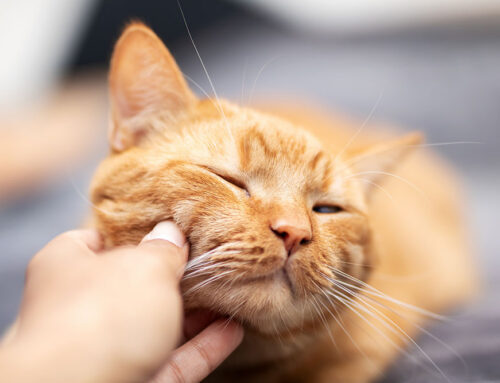Coughing, Sneezing & Wheezing in Pets: When to Worry
What You Need to Know
Hearing your pet cough can be concerning. Coughing is a common symptom in pets and can be triggered by various factors, ranging from mild irritants to serious health conditions. At Mission Veterinary Clinic, we are committed to helping you understand the potential causes of pet coughing and determining when veterinary care is necessary. This guide explores the reasons behind pet coughing and highlights when immediate attention is needed.
Exploring Causes of Coughing in Pets
Coughing in Dogs and Cats
Coughing is a natural reflex that helps clear the airways of irritants, mucus, or foreign objects. Pets may cough for a variety of reasons, from environmental allergens to more serious medical conditions. While some pets may have occasional, mild coughs, others may experience persistent, intense coughing accompanied by additional symptoms such as lethargy, weight loss, or difficulty breathing.
Infectious Causes
Infections are a frequent cause of coughing in both dogs and cats. For example, Bordetella bronchiseptica, commonly known as kennel cough, is a highly contagious bacterial infection affecting dogs. In cats, viral infections often lead to feline upper respiratory infections, which can cause coughing, sneezing, and nasal discharge.
These infections spread quickly in environments where multiple animals interact, such as boarding facilities or shelters. Preventative measures include vaccinations and maintaining good hygiene practices. If left untreated, infections like kennel cough can lead to secondary complications such as pneumonia, while feline respiratory infections may result in chronic breathing difficulties.
Non-Infectious Causes
Not all coughing in pets stems from infections. Several non-infectious factors can contribute to coughing episodes, including:
- Allergies – Environmental allergens like dust, pollen, and smoke can irritate a pet’s airways.
- Heart Disease – Conditions such as congestive heart failure can lead to fluid buildup in the lungs, causing a persistent cough.
- Foreign Objects – Small objects lodged in the throat or airways can trigger severe coughing.
- Brachycephalic Obstructive Airway Syndrome (BOAS) – Breeds like Bulldogs and Pugs may suffer from breathing difficulties due to their anatomy. Learn more about BOAS.
Recognizing the underlying cause of a pet’s cough is crucial for proper treatment and care.
Recognizing When to Seek Veterinary Care
Signs That Require Veterinary Attention
While some mild coughing may resolve on its own, persistent or severe symptoms should not be ignored. Seek veterinary care if your pet exhibits:
- Coughing lasting more than a few days
- Coughing up blood or unusual substances
- Additional symptoms such as lethargy, loss of appetite, or fever
- Difficulty breathing or choking sounds
Early intervention can prevent minor issues from developing into serious conditions, such as pneumonia or chronic heart disease.
Severe Respiratory Distress
Respiratory distress in pets is a medical emergency. Critical warning signs include:
- Labored breathing or open-mouth breathing
- Blue-tinged or pale gums
- Sudden collapse or extreme weakness
If your pet shows any of these symptoms, seek emergency veterinary care immediately. Learn more about respiratory distress in pets.
Diagnostic and Treatment Options at Mission Veterinary Clinic

What to Expect During a Veterinary Visit
When you bring your pet to Mission Veterinary Clinic for a coughing evaluation, our team will conduct a comprehensive physical exam. Diagnostic tests may include:
- X-rays to assess the lungs and heart
- Blood tests to detect infections or systemic diseases
- Ultrasound or bronchoscopy for more detailed airway examination
These tests help us pinpoint the underlying cause and determine the most effective treatment plan.
Treatment Options
Treatment varies based on the diagnosis and may include:
- Antibiotics for bacterial infections
- Cough suppressants for persistent, non-infectious coughs
- Medications for heart disease, such as diuretics or ACE inhibitors
- Surgery for obstructions or anatomical issues
Our goal is to address the root cause of your pet’s symptoms and restore their health and comfort as quickly as possible.
Preventative Measures for Pet Health
Tips for Preventing Cough-Related Diseases
Proactive care can significantly reduce the risk of coughing-related illnesses. Key preventative steps include:
- Routine Vaccinations – Protect against common infections like kennel cough and feline respiratory diseases.
- Regular Veterinary Checkups – Early detection of heart disease and other conditions can prevent complications.
- Clean Living Environment – Reduce allergens by cleaning pet bedding and using air purifiers.
- Healthy Diet and Exercise – Helps maintain a strong immune system and reduces obesity-related respiratory issues.
By prioritizing preventative care, pet owners can support their pets’ overall well-being and minimize respiratory health risks.
FAQs About Pet Coughing
What should I do if my pet starts coughing suddenly?
Monitor your pet for additional symptoms such as difficulty breathing, lethargy, or loss of appetite. If the cough persists or worsens, contact your veterinarian promptly.
Can secondhand smoke cause coughing in pets?
Yes, secondhand smoke can irritate a pet’s airways, leading to coughing and potentially worsening existing respiratory conditions. Keeping your home smoke-free is advisable.
How can I make my home safer for a pet with respiratory issues?
Maintain good ventilation, use air purifiers, and avoid strong chemicals or aerosols. Regularly wash pet bedding and vacuum to reduce allergens.
Monitoring your pet for signs of coughing and responding appropriately is essential for their well-being. Mission Veterinary Clinic is dedicated to providing expert care and guidance to ensure your pet remains healthy. If you have concerns about your pet’s cough, don’t hesitate to reach out—we’re here to support you every step of the way.










Leave A Comment